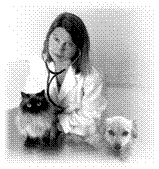Career Option in Veterinary Science

Veterinary science is the medical care of animals - both domestic and wild and involves the application of medical, diagnostic and therapeutic principles in animal healthcare. It involves monitoring animal production practices, herd health and the spread of diseases. Knowledge of multiple disciplines and use of technical skills are required for this. Of late, the spread of zoono-tic diseases around globally has created a need for preventing the spread of epidemics.
Education Details & Eligibility:
To pursue a course in diploma, the basic requirement is 10th standard plus good performance in English, Mathematics and Science. The bachelor degree requires 12th standard or equivalent.
Course Duration:
The Bachelor of Veterinary Science and animal husbandry (B.V.Sc or BVSC) is a bachelor's degree for studies in veterinary science in India, United Kingdom and some other countries. It is a 5-year course in India. (Cambridge Veterinary School's course lasts 6 years and the degree awarded is a VetMB). Some universities will award the students a B.Sc after the first 3 years, and the B.V.Sc after the final 2 years. The degree is generally required for becoming a veterinarian in the countries where it is awarded.
Approximate Education Expenses:
A student's actual annual fee may vary in accordance with his or her choice of major and electives.
The total expense for doing BVScand MVSc are as follows :
- B.Sc - Rs.30000/ per year - (approx) - (3 Years)
- BVSc - Rs.50000/ per year - (approx) - (5 Years)
- MVSc - Rs.40000/ per year - (approx) - (2 Years)
There are over forty-five veterinary colleges in India offering B.V.Sc & A.H. For details on colleges please visit www.StudyGuideIndia.com.
Job opportunities are plenty for graduates in veterinary science and animal husbandry. State and central government service, university service after obtaining a postgraduate degree, nationalized and schedule banks, insurance companies, pharmaceutical and biological industry in both R&D wing and in marketing of medicines and biologicals, corporate farms, food industry, knowledge process outsourcing (KPO) agencies etc, are some of the opportunity areas.
In corporate dairy and poultry farms, veterinarians function as functional supervisors of farms, processing plants, feed manufacturing, marketing of livestock products, like live poultry, meat, milk, egg etc.
Veterinary graduates also can establish hatcheries, feed manufacturing units, wholesale outlet for trading poultry and livestock products etc. Small animal practice in cities and big towns is a lucrative option. In the era of corporatization of animal agriculture, veterinarians are sought in both designing and implementation as project consultants.
In KPOs, veterinarians validate the data generated on different aspects of biodiversity involving animals, veterinary medical records etc. The course also imparts proficiency in a range of subjects and students excel in competitive examinations for higher study at national and international levels.
Graduates of these programs may be found working in the veterinary and human pharmaceutical industries, the livestock and pet supply and feed industries, farming or in academia. Veterinarians assist in ensuring the quality, quantity, and security of food supplies by working to maintain the health of livestock and inspecting the meat itself.
Veterinary scientists occupy important positions in biological, chemical, agricultural and pharmaceutical research. In many countries, equine veterinary medicine is also a specialized field. Clinical work with horses involves mainly locomotors and orthopedic problems, digestive tract disorders (including equine colic, which is a major cause of death among domesticated horses), and respiratory tract infections and disease.
Zoologic medicine, which encompasses the healthcare of zoo and wild animal populations, is another veterinary specialty that has grown in importance and sophistication in recent years as wildlife conservation has become more urgent. Veterinarians must complete four years of study in a veterinary school following 3-4 years of undergraduate pre-veterinary work. They then must sit for a national examination as well as examinations in those states in which they wish to become licensed practitioners.
Veterinarians are expected to diagnose and treat diseases in a variety of different species without benefit of verbal communication with their patients. In addition to veterinarians, many veterinary hospitals utilize a team of veterinary technicians and veterinary assistants to provide care for sick as well as healthy animals.
Veterinary technicians are, essentially, veterinary nurses and are graduates of two or four year college-level programs and are legally qualified to assist veterinarians in many medical procedures. Veterinary assistants are not licensed by most states, but can be well-trained through programs offered in a variety of technical schools.
The salary varies significantly based on experience and skills. In India the salary for a fresher is Rs.3000 to Rs.15000 per month. It increases based on experience.
American Veterinary Medical Association (AVMA)
Website:www.avma.org
KERALA LIVESTOCK.
Website: www.livestockkerala.org
 Add College
Add College Login
Login